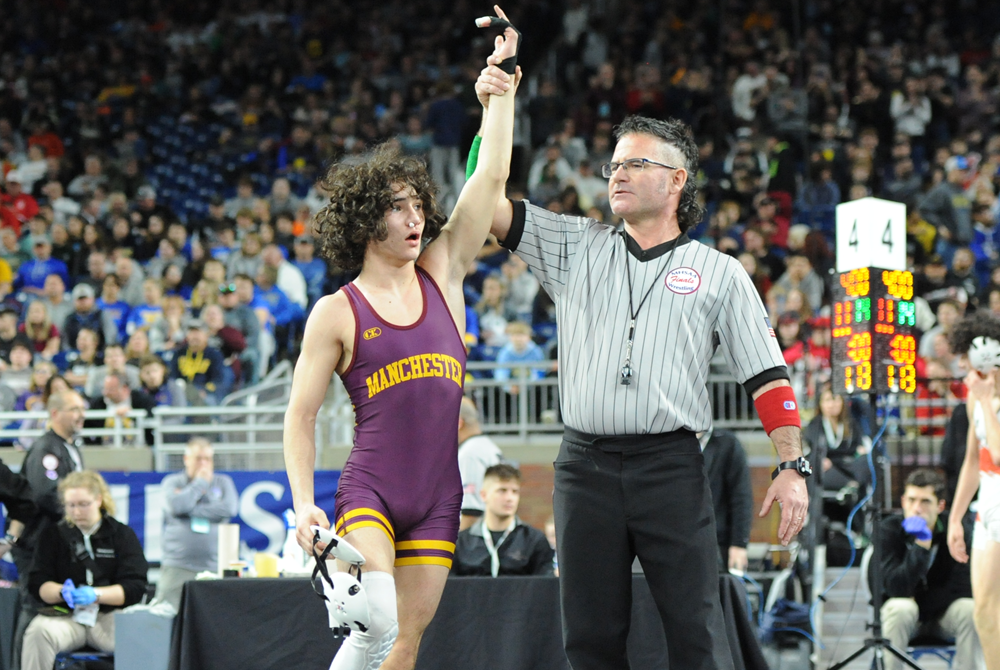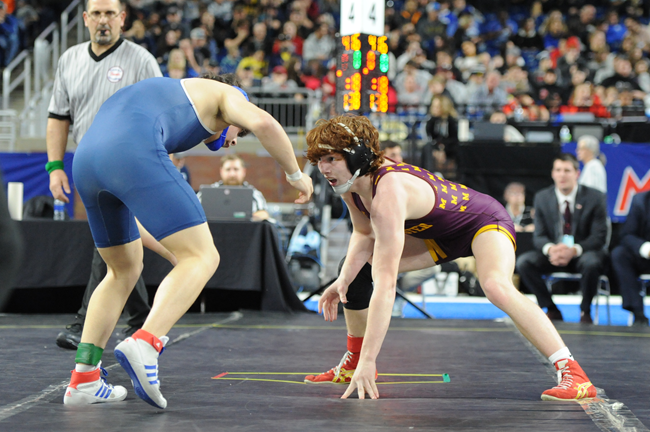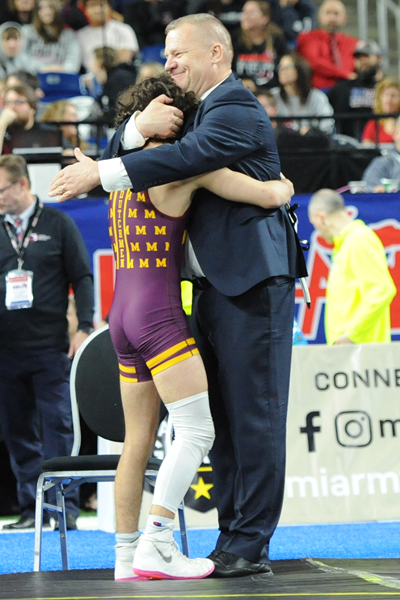
Nurturing Our Lower Level Programs
May 15, 2014
By John E. “Jack” Roberts
MHSAA Executive Director
When I’ve been faced with the most difficult choices as to different courses of action for the MHSAA, I’ve tried to face up to this reframing of the issue: “If we were creating the MHSAA for the first time today, would we do this, or would we do that?”
For example, would we or would we not limit coaches’ contact with athletes out of season? Would we have a 90-day period of ineligibility for transfer students or would it be 180 days?
There are other examples of such “either, or” questions I could provide, but none is as difficult or defining as this: Should school sports under the MHSAA’s auspices provide more opportunities for 7th- and 8th-graders and new opportunities for even younger students?
I won’t be coy about what I think our answer should be. I haven’t always felt this way, and I recognize it is a different opinion than some who are quoted in this publication; but today it’s my belief that if we were creating the MHSAA for the first time in 2014, the MHSAA would allow more contests and longer contests for 7th- and 8th-graders, and the MHSAA would have competition policies and programs for younger middle schoolers too.
I believe this is what parents want for their children and what students want for themselves; and I believe, within reason, that the better we serve these students in their junior high/middle school years, the stronger high school sports will be and the better these programs will support the educational missions of schools.
I believe we must begin to serve middle school students more comprehensively, and that our doing so today is the best hope we have for retaining comprehensive programs for high school students tomorrow. Not only does the lower profile and pressure of lower level programs nurture the highest ideals of educational athletics, they provide our highest hope for preserving those ideals at the high school level.
The Lasting Impact of First Impressions
The over-arching question before us is how to maintain policies that encourage multiple sport experiences for students at the junior high/middle school level while at the same time adjusting those policies in terms of grade level served and the numbers and lengths of contests allowed in order to be more attractive to junior high/middle school parents and to school districts which desire additional competition opportunities in the school setting for students prior to high school.
There is a good healthy discussion in our midst about the scope of junior high/middle school athletics – how much should occur and how young it should commence; and the result of these discussions may have long-lasting effect on students, schools and the MHSAA.
Here are two central issues:
1. Contest Limits
Many people over many years have contributed to developing the current season limitations for the number of contests permitted by MHSAA member junior high/middle schools. These good people have believed in a philosophy of sports at this level that encourages students to try multiple sports.
“Kids haven’t fully matured yet,” they say. “Kids haven’t been exposed to some sports yet. They don’t know what they might like or be good at. So let’s have policies and programs that encourage new opportunities and experiences at this level.”
The season limits that have been put in place allow some junior high/middle schools, or their entire leagues, to fit four distinct seasons in a nine-month school year, consistent with this over-arching philosophy to encourage these students to try new things and learn.
There is another educationally grounded and equally astute group of administrators and coaches who are concerned that the current limits are too severe in comparison to non-school youth sports programs. For example, community/club basketball or soccer programs may schedule 15 or 18 or more games per season versus the MHSAA limit of 12 at the junior high/middle school level.
These folks think these restrictive limitations create a disincentive for kids to play school sports, and that many of those who have no place in junior high/middle school sports have no interest later in high school sports.
2. 6th-Graders
Historically, the popular opinion among educators has held that 7th and 8th grade is early enough for schools to provide competitive athletics, early enough to put youth into the competitive sports arena, and early enough to pit one school against another in sports.
Today, however, many educators and parents point out that such protective philosophies and policies were adopted about the same time “play days” were considered to be the maximum exertion females should experience in school sports. Some administrators and coaches argue that both our severe limits on contest limits at the junior high/middle school level, and our refusal to serve 6th-graders, are as out of date and inappropriate as play days for females.
Today, in nearly four of five school districts with MHSAA member schools, 6th-graders go to school in the same building with 7th- and 8th-graders. But MHSAA rules don’t allow 6th-graders to participate with and against 7th- and 8th-graders. In fact, the MHSAA Constitution doesn’t even acknowledge that 6th-graders exist.
Today, in many places, 6th-graders have aged-out of non-school, community sports, but they are not permitted to play on MHSAA junior high/middle school teams.
Last school year, 50 different school districts requested this rule be waived for them, and the MHSAA Executive Committee approved 46 of 50 waivers, allowing 6th-graders to compete on 7th- and 8th-grade teams. During 2011-12, 37 of 40 requests for waiver were approved, in all cases for small junior high/middle schools. Many of these schools want, and some of them desperately need, these 6th-graders to fill out junior high/middle school teams.
Young people are starting sports much younger today than 100 years ago when the MHSAA was created. Younger than even 50 years ago when the MHSAA was incorporated. If the MHSAA were created today to serve any students before 9th grade, I’m certain it would not leave out 6th-graders who are walking the same halls with 7th- and 8th-graders, and who have been playing competitive sports almost since the first day they started walking at all.
Eyes on the future
The most important thing we can do to enhance high school sports is to grow junior high/middle school sports programs. The earlier we disconnect young people from non-school sports and engage them in school-sponsored sports, the better our chances are of keeping high school athletic programs healthy, and the better our prospects are of keeping both participation rates and conduct standards high.
School sports are in competition for hearts and minds of young people. Our competition includes movies, jobs, cars, video games, boyfriends and girlfriends and club sports ... especially club sports. School sports needs to market itself better, and part of better is to be available earlier – much sooner in the lives of youth. More contests at the junior high/middle school level and more opportunities for 6th-graders should be parts of our marketing strategies on behalf of educational athletics generally.
For at least 50 years there have been predictions by people outside of our member schools that the system of school-sponsored sports that is almost unique to the United States would someday give way to the system of most countries where youth sports is provided by non-school community groups and private athletic clubs. Some people challenge school-sponsored sports on a program basis – for example, that competitive athletics creates a distraction to the core educational mission of schools. Others may challenge school-sponsored sports on a financial basis – that interscholastic athletics compete for the limited resources communities have to support their schools.
Today there also exists among our member schools a small percentage of administrators who have come to their leadership roles without involvement in school sports and who either desire and believe that interscholastic sports will be moved from schools to communities or who do not want but predict that such will occur as resources for schools continue to shrink.
I believe this is more likely to happen, or to happen sooner, if we do not change our approach to junior high/middle school sports. If we continue to restrict 7th- and 8th-graders to so few contests of such limited length compared to what those students have in non-school sports, and if we continue to offer nothing for younger students, we essentially and effectively force these students to non-school sports.
It is an often cited statistic that between 80 and 90 percent of all young people who ever begin playing competitive athletics stop playing before they reach the age of 13, meaning the vast majority of young people never, ever are involved in school programs. Thus, it is no mystery why people question the future of school sports. We’re doing nothing to make programs available to them. They have no experience in them.
Our restrictive and possibly outdated policies and procedures regarding contest limits and lengths and the age at which we begin to serve junior high/middle school students may assure that the dire predictions about school sports’ future will be accurate. We are doing too little, too late. It is marketing at its worst.
In my mind there is little doubt that we are doing too little too late with junior high/middle school students. Now the challenge before us is to think beyond “we can’t afford it” and make some necessary changes, while still avoiding a system that allows or even encourages schools doing too much too soon.

Longtime Coach Vlcek has Manchester On Pace to Contend in D4 Title Race
By
Doug Donnelly
Special for MHSAA.com
December 19, 2023
Steve Vlcek is 34 years into his varsity coaching career at Manchester and might have his best team yet.
 The season still has a long way to go, of course, but Vlcek is confident that what is being built right now in the Flying Dutchmen wrestling room is something special.
The season still has a long way to go, of course, but Vlcek is confident that what is being built right now in the Flying Dutchmen wrestling room is something special.
“I always call this our preseason,” he said. “We’ll have four tournaments before the new year. That’s 26 or 27 matches per kid. That way, we can figure out where we are at, what we need to work on more. Then we can start tweaking stuff a little bit.
“It’s been a really great start. I see a lot of improvement in our team.”
Vlcek, who has won more than 700 meets in his career, and Manchester have been on the cusp before. The Flying Dutchmen have won 18 straight District championships and own a dozen Regional titles. Manchester was the Division 4 runner-up in 2008 and has reached the Semifinals multiple times.
The last two years, they’ve qualified for MHSAA Team Finals weekend but have lost the first day in Quarterfinals.
“It’s been a little frustrating, but you have to keep plugging away,” Vlcek said. “We’re trying. We have a good shot the next couple of years.”
Vlcek was a football guy at Manchester, but when the school didn’t field football in 1981, he turned to wrestling.
“We didn’t have football my freshman year, and I was driving my mom crazy,” Vlcek said. “I took up wrestling.”
During his four years with the varsity, Manchester went through three coaches. It was his final coach, Dan Jordan, who invited Vleck back a couple of years later to work with some of the wrestlers on the team.
 “He called me up and asked if in my free time I would come and work with a couple kids,” Vlcek said. “Two years later, I was the junior high coach, and two years after that he resigned, recommended me for the job and I got it. He did a really good job of bringing up the program.”
“He called me up and asked if in my free time I would come and work with a couple kids,” Vlcek said. “Two years later, I was the junior high coach, and two years after that he resigned, recommended me for the job and I got it. He did a really good job of bringing up the program.”
Vleck never thought he would be a coach, but it became his passion.
“Once I started working with the kids, I really enjoyed it,” he said. “I wasn’t sure how much I would like it as a 19-year-old, or 20-year-old kid, but I did.”
Some of his early Manchester teams struggled with numbers. They’d often have seven or eight wrestlers win matches but lose in a dual-meet format because of the forfeits. That started to change during the mid-2000s.
“We started getting good classes together, and that made a considerable difference,” he said.
He picked things up from rival coaches, some of whom he has become friends with over the years.
“You pick up little things from each coach you coach against,” he said.
He credits a strong youth program at Manchester with developing wrestlers at a young age.
“We have a very involved youth program,” he said. “They’ve brought a good product to me. I try to stay away from it, let them develop it. We are very lucky to have it.”
He also credits a slew of assistant coaches, such as Mike Bunn.
“I can name 20 guys who have come into the room and make the program better every day,” he said. “I have my son (Brock) coaching with me now, and I really enjoy that.”
 The Flying Dutchmen have 10 juniors on this year’s squad, including Sammy Stewart, who won an Individual Finals title last year at 113 pounds, and Blake Sloan, who was runner-up at 138.
The Flying Dutchmen have 10 juniors on this year’s squad, including Sammy Stewart, who won an Individual Finals title last year at 113 pounds, and Blake Sloan, who was runner-up at 138.
Stewart missed a good part of the 2022 season while recovering from a hand injury.
“He had a really bad accident in shop class,” Vlcek said. “He almost cut his hand off. He came back in mid-January. He definitely had to overcome some obstacles. He avenged the loss he had (during the regular season) in the state finals.”
Sloan is another of the super sophomores. He’s coming off a record-setting football season in which he rushed for more than 2,100 yards.
“I can’t ask more out of those guys,” Vlcek said. “They put their time in and help their teammates out. We have seven or eight kids who have been state qualifiers. We still have some work to do, but there is improvement.”
Manchester is 10-2 in dual meets to start this season, giving Vlcek 711 career victories. The Flying Dutchmen have played a good schedule and have been ranked anywhere from No. 2 to No. 5 in early-season team rankings.
“I like to be challenged,” Vlcek said. “You don’t get better without wrestling the best.”
 Doug Donnelly has served as a sports and news reporter and city editor over 25 years, writing for the Daily Chief-Union in Upper Sandusky, Ohio from 1992-1995, the Monroe Evening News from 1995-2012 and the Adrian Daily Telegram since 2013. He's also written a book on high school basketball in Monroe County and compiles record books for various schools in southeast Michigan. E-mail him at [email protected] with story ideas for Jackson, Washtenaw, Hillsdale, Lenawee and Monroe counties.
Doug Donnelly has served as a sports and news reporter and city editor over 25 years, writing for the Daily Chief-Union in Upper Sandusky, Ohio from 1992-1995, the Monroe Evening News from 1995-2012 and the Adrian Daily Telegram since 2013. He's also written a book on high school basketball in Monroe County and compiles record books for various schools in southeast Michigan. E-mail him at [email protected] with story ideas for Jackson, Washtenaw, Hillsdale, Lenawee and Monroe counties.
PHOTOS (Top) Sammy Stewart’s hand is raised by the official in victory after the Manchester standout won his championship match at the Individual Finals in March. (Middle) Teammate Blake Sloan, right, considers his next move during his championship match last season. (Below) Coach Steve Vlcek embraces Stewart after the victory. (Click for more from High School Sports Scene.)

